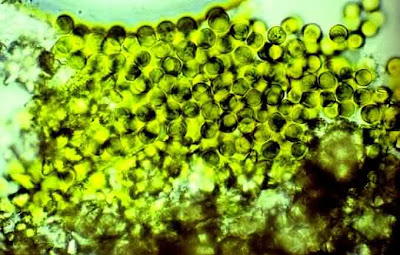Copyright © 2009 Ernest Bloom.
Too intelligent to be one they concerned themselves about, I
remained too invisible and too unwise to learn much of anything
truly useful. I never learned to read the literature
as an undergrad. I never found a mentor to guide me. Cast to
the mindless inertia of lecture-auditoria housing some
two hundreds plus, I was quickly lost in the regurgitation
of factoids I'd long-since mastered. I had no money. I had to
work while I was in college, cooking breakfasts for others
while I remained hungry, or answering their phones,
or assisting the dorm's Head Resident. I was too tired in those
lectures, and I sometimes found myself dozing, my pencil
trailing off the edge of my notebook paper. Flung like a
meteoric missile into college and immediately forgotten
when there was no email, no Internet, no cell phones, and
long distance calls were still a pricy extravagance.
Several years later I first walked through the door of
Bob Hoshaw's Algal Research Laboratory. I was autoclaving
soil and water bottles for him, brewing up instant
growth medium for the propagation of his extensive
collection of American strains of
Spirogyra. I pondered
occasionally how to enkindle passion among their
(+) and (-) strands and generate football-shaped baby
zygospores, but never to any avail. I even considered
attempting to fuse denuded protoplasts with
polyethelyne glycol, just as I'd been trained to make
chimeric human-mouse hybridoma cell lines, but there was
always that pesky cell wall to negotiate, not to mention
osmotic pressure. Back then there was too much I
didn't know that I didn't know.
Undergrads of course have to prove themselves, a fact I
could not appreciate. We were a dime a dozen, or less,
and few enough would ever go on into academia or
other research, and those are the true professorial passions.
Your professors have no incentive to invest their precious
time with those who show no sign of taking up the mantle
and following in their footsteps. Despairing of my choices,
I even came fairly close to changing my major from Cell
and Developmental Biology to English. I was a First Son
of the Space Age, though, and society, with its Cold War, had
successfully infused Science into my genetic make-up, but I
also loved to write, although I knew nothing about either
discipline, really, in those days. Discipline: everything I'd
known about discipline I'd long since forgotten or abandoned.
But then, out of the blue, seemingly, I received a letter
(April 1982) from an uncle I seldom saw or spoke with,
advising me to do that very thing: to shun science, to
become an English major*, to lose myself in the classics:
(1) Read everything you can get your hands on. Start
With Shakespeare, Chekhov, Dostoevsky. Read Kafka,
Hesse, and Thomas Mann. Read D.H. Lawrence, read
James Joyce. Read Hemingway and Steinbeck. Read
'em all. Read 'em and weep.
(2) Get out and observe. Live life, see the people, talk
to them. There's never been a character created that is
half as interesting as real people.
(3) Write it down. I'm sure you know this one. Write
down your feelings, especially. Try to capture them.
Writing is just a tool ‑‑ you learn how to use it by using it.
I cannot tell you the shocks this sent through the system. It was
as though this person were reading my mind from a distance,
and the timing of this letter was impeccable. His distant,
clairvoyant mind seemed oddly in tune with mine, and we
took to calling him my phase uncle. This added more fuel
to the fire to get out of science altogether, although in the end
I decided not to do so. It was apparent to me that it would be
easier to learn science and do writing on the side than
the inverse, and that science was more likely to provide
an income in the meantime. Someone else will have to judge
whether I made the right choices or not. I am something of a
Hugh Everett devotee, and I believe myself that I made
all possible choices. . . .
During my last semester as an undergrad I took as few
classes as I could to graduate, and made them as enjoyable
as possible. This included an oceanography elective, with a few
trips down to Puerto Peñasco, Sonora, Mexico, on the
Baja coast, where I was first introduced to the unicellular
alga
Procholron, which grows symbiotically on certain
leathery sessile tunicates found in the intertidal zone. This
connected up fairly neatly with my work in Bob Hoshaw's lab.
The imminent threat I now faced was that I was soon to
graduate, and I had no idea what kind of job to get in the
averred Real World. Another interest I'd always had was the
Antarctic so now, consulting with Dr. Hoshaw, I went searching
for intersections between algae and the Great White South.
I identified several possible labs, among them that of
Greta Fryxell. One day I had a scheduled telephone conference
with her, which I made from a payphone outside the
BioSciences West building. I arrived with a few pocketsful of
quarters and thus set the stage for the next phase of
my career, which would eventually find me shivering in a
walk-in refrigerator at the heart of a towering white building
located deep in the heart of Texas under a flesh-scalding sun,
where we sustained culture flasks of ice diatoms recovered
from the receding ice shelf, including my own personal
favorite,
Eucampia antarctica. But my days spent as a
reluctant oceanographer comprises another strange tale; I'm
talking about the undergraduate experience here.

If you want my advice, learn all about your professors'
personal interests as early as you can, and find one to whom
you think you can relate, at least more or less, and then
try to land a place in his or her lab, or among the local
office staff, and do it as early as you possibly can. Then you'll
see what's what, and what matters and what doesn't, and
then it will all start to soak in, no matter how slowly at first.
Then your undergrad experience is sure to be so much richer.
You require a professor who sees the spark of passion in you,
and who will take you under his wing and guide you, subtly or
not so subtly, through the mysterious mazes that beset you.
No matter how intelligent you think you are, or how intelligent
you truly are, you require what I never found: a wise mentor,
whether or not you always agree with or adhere to his sage
(or not) advice. And force yourself to read the literature,
even though it's sure to mean next to nothing to you for a
long, long while as, without suspecting as much, maybe,
you're slowly building up a database of facts and opinions
that will carry you far, although you don't even notice it
at the time.
*In truth he did not quite encourage me to become an English major:
So you think you want to be a writer, do you. Then what the hell are you doing wasting your time in college? I'm sure you've discovered by now that school is 90% bullshit. The best thing about college is that it delays adulthood for four (or more) more years. If you want to write, you should be doing three things.
His three recommendations are listed in the text above. I could not conceive of dropping out of college; nor would I advise anyone else to do so except under the most extreme circumstances.




